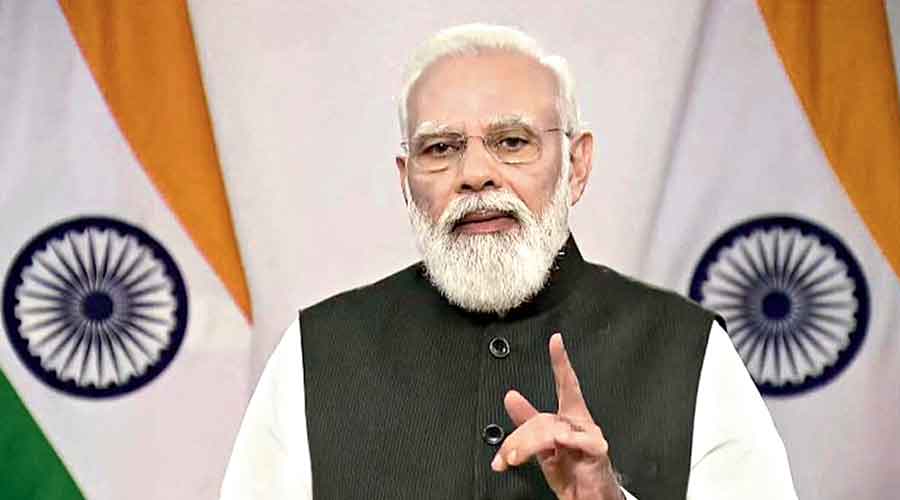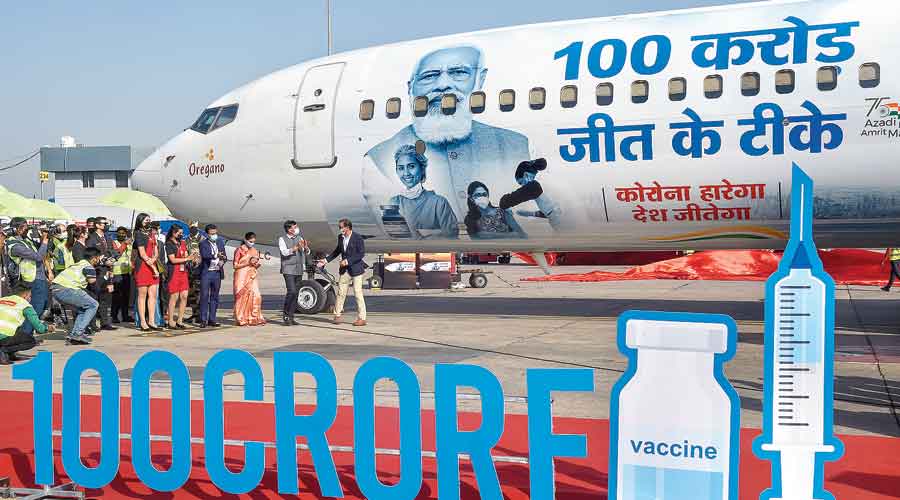Prime Minister Narendra Modi on Friday sought to bask in the afterglow of India administering 1 billion Covid-19 jabs, portraying this in an address to the nation as an achievement of the “new India” being built on his watch.
While acknowledging the collective effort behind the feat, the Prime Minister said the milestone was not just a number but “a new chapter” and a “picture of that new India” that knew how to set and achieve difficult goals.
Sections of health experts said Modi’s speech appeared to reflect his government’s penchant for engaging in “image building” at every available opportunity while disregarding the planning and response failures that cost lives and limited the pace of the vaccination campaign.
In his 17-minute speech, Modi said the billion doses administered were a fitting reply to the questions raised about India’s ability to meet the challenges posed by Covid-19 and the scale of the vaccination campaign.
He made no mention of the lives lost during the country’s second Covid-19 wave, which many experts believe could have been less brutal had the Centre curbed mass gatherings by mid-February and arranged for more oxygen cylinders, hospital beds and medicines.
“Public health milestones should not be political spectacles,” said R. Ramakumar, professor of developmental studies at the Tata Institute of Social Sciences, Mumbai, and one of the experts to have criticised the Centre for not planning adequately for the vaccination campaign.
Health experts also flagged Modi’s assertion during his speech that “India has given 100 crore vaccine doses to its citizens, that too free”.
“This is a government’s duty -- in almost all countries, rich and poor, Covid-19 vaccines worldwide are free,” said Rijo John, a health economist at the Rajagiri College of Social Sciences, Kochi. “Our own country’s universal immunisation programme has been free for decades. It is paid from taxpayers’ money.”
While the government has offered free Covid-19 jabs to all, it has also kept open the private sector channel for those opting to pay for the vaccination.
“Jagadguru of Jhoot excelled himself today rewriting history, twisting facts, distorting reality, making meaningless comparisons, beating his own chest — in short, being himself. While he forgot those who suffered loss of lives and livelihoods from Covid-19 due to his Govt’s failures,” Congress leader Jairam Ramesh tweeted.
CPM leader Sitaram Yechury, who lost his son to Covid-19 during the second wave, had on Thursday questioned the billionth-dose celebrations.
“A billion vaccinations is a landmark. But celebrations? Modi government has abandoned its own target of fully vaccinating all adults by year end,” he had tweeted.
Modi sought to project a widespread euphoria over the billion vaccinations, asserting that “there is optimism all around in every section from society to economy”.
Claiming that many agencies in India and abroad were positive about India’s economy, he said: “With record investments, start-ups are becoming unicorns. New energy is also visible in the housing sector. The various reforms and initiatives undertaken in the last few months -- from GatiShakti to the new drone policy – will play an important role in helping India’s economy grow faster.”
Advocating the use of “Made in India” products, he repeated his “vocal for local” slogan and projected the vaccine milestone as a “ray of hope” for shopkeepers, entrepreneurs and street vendors ahead of Diwali.
But experts say the billionth-dose celebrations shouldn’t overshadow the vaccination campaign’s unmet targets. The campaign had initially aimed at fully vaccinating all the priority populations, 45 years or older, by August-end.
“India has failed to meet this goal,” said John, who estimates that India has nearly 30 million people aged 60 or older who are yet to get their first dose, and 75 million waiting for their second dose.
A public health specialist who requested not to be named said that throughout the pandemic, the Centre had through the health ministry used numbers and statistics to portray achievements.
The health ministry described the billionth dose on Thursday as a “major milestone”.
But, the specialist said, it had also described as a “landmark milestone” the 420 millionth dose on July 23, the 540 millionth dose on August 14, the 750 millionth dose on September 13, the 840 millionth dose on September 23, the 910 millionth dose on October 4, and the 980 millionth dose on October 18.
Target worry
Going by health ministry figures, India needs to administer 12.3 million Covid-19 vaccine doses every day from now on to fully vaccinate its entire estimated adult population of 944 million. But the average this month so far has been less than 6 million daily doses.
Some 230 million adults are yet to get even a single dose, Reuters said.
One of the hurdles to meeting the December 31 target is the unusually large gap the government has stipulated between the doses of the most widely used vaccine, Covishield. Another is the growing complacency as cases fall.
Covishield has a 12-to-16-week gap between doses in contrast to the 8-to-12-week gap recommended by the World Health Organisation. Based on current trends, this dosage gap means more than 200 million people will be eligible for their second dose only in mid-January even if all of them were to get their first shot on Friday.
Also, people are growing increasingly complacent about getting inoculated with infections and deaths falling sharply in the past month. In September, the country recorded an average 7.8 million jabs a day, which plunged below 6 million a day in October.
“It is likely that the (December 31 target) may be missed by several weeks,” said Rajib Dasgupta, head of the Centre of Social Medicine and Community Health at JNU. “Reducing the Covishield dosage interval is certainly a possibility to consider.”
While the health ministry did not respond to Reuters’ requests for comment on Friday, it had told the agency on Monday that its immunisation experts were “actively considering the matter of dose interval between Covishield doses”.
However, health experts are not too worried about many people not getting their second doses in 2021, though they say it would be safer for the population to be fully inoculated as soon as possible.
A government study in July estimated that more than two-thirds of Indians already had Covid-fighting antibodies, mainly through natural infection. That gives them substantial protection even with one dose unless more infectious variants emerge.
About 75 per cent of India’s adult population have received at least one Covid-19 dose, while 31 per cent are fully vaccinated, according to government data.
“At least one dose we should be able to give to most of the adults by the end of the year,” N.K. Arora, who leads a government group on immunisations, told NDTV news channel late on Thursday.











